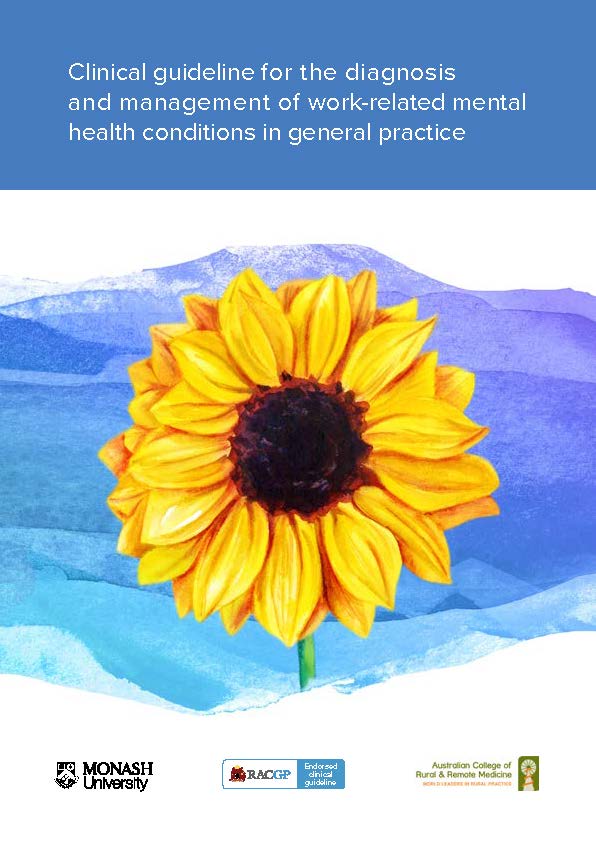Frontline care for people experiencing mental health conditions is usually provided by general practitioners (GPs). These conditions – whose total cost to society has been estimated at $10.9 billion per year1 – impact on a person’s physical, social and financial wellbeing, work productivity and more, and when work-related they are particularly complex and challenging to manage.
The NHMRC-endorsed Clinical guideline for the diagnosis and management of work-related mental health conditions in general practice (the Guideline), developed by a team led by researchers at Monash University, provides GPs with the best available evidence to guide and support their diagnosis and management of patients with such conditions.
A landscape format version of this case study is available as a PDF from the Downloads section below.
Origin
In Australia, mental health conditions are one of the main reasons for long-term sick leave and work incapacity. In fact, people who are on sick leave due to a work-related mental health injury take three times longer to return to work than those on leave for other injuries.2 Almost all injured workers seek help from a GP and where the patient has symptoms of a mental health condition, GPs undertake the initial assessment, initiate a management plan and provide ongoing care. However, managing work-related mental health conditions is complex.
Clinical challenges faced by GPs include:
- initial assessment and diagnosis, challenging because of the invisibility of the injury
- establishing whether the mental health condition developed as a consequence of work
- conflicting opinions about the causality, severity, treatment and prognosis of the condition
- difficulty in managing comorbid conditions
- uncertainty in predicting a return to work date and recommending alternative duties.
Patients rely on GPs to offer advice about the compensation claims process, and compensation schemes ask GPs to form judgements about the work-relatedness of a mental health condition and whether a patient can stay at or return to work. Consequently, there is significant demand from GPs for guidelines providing effective methods for managing work-related mental health conditions.
Grants and Investment
NHMRC funding and support
As part of its legislated role in approving third party guidelines, NHMRC assisted the developers of the Guideline. NHMRC also provided support for the IMPRovE Partnership Project (2019) and for capability development as follows:
Professor Danielle Mazza
- Partnership Projects, 2010, 2017; Project Grants, 2014, 2015, 2017; Centre of Research Excellence (CRE), 2014 (x2); Boosting Dementia Research Initiative (BDRI), 2016
Professor Alex Collie
- Project Grants, 2005, 2014; CRE, 2014
Associate Professor (A/Prof) Bianca Brijnath
- Early Career Fellowship (ECF), 2012
Emeritus Professor Justin Kenardy
- Project Grants, 2001, 2004, 2005 (x2), 2009 (x2), 2011, 2014 (x2); CREs, 2007, 2014; Partnership Project, 2014

Other funding and support
Development and implementation of the Guideline has been made possible by the financial and in-kind support provided by 10 partner organisations.
Development
At the request of policy makers, in 2012, researchers at Monash University undertook qualitative interviews with 93 Melbourne-based GPs, injured patients, compensation agents and employers. During this initial work, GPs called for assistance in dealing with the clinical uncertainties and system complexities they face in facilitating recovery and return to work for their patients.
In 2016, the Monash team embarked on the development of a national clinical guideline to help GPs improve their management of patients with work-related mental health problems. This Guideline was developed with support from six workers’ compensation authorities from across Australia, and was overseen by a Guideline Development Group that comprised a consumer and clinical, content and context experts.
To ensure that the Guideline addressed the clinical needs of practising GPs, the Group interviewed GPs, psychiatrists and compensation scheme workers from around the country to get their perspective on the critical issues that the Guideline needed to address.
Interviewees were asked to reflect on a suite of real-patient scenarios and consider the clinical dilemmas that they might face in dealing with these cases. These dilemmas then became ten key questions addressed by the Guideline. Systematic literature reviews were undertaken for each clinical question to build the evidence base for the development of Guideline recommendations. Where adequate evidence was not available the team used a consensus-based approach to build on the clinical and industry expertise and consumer input.
A draft version of the Guideline was released for public consultation in early 2018. Feedback on the draft was reviewed and incorporated into the final Guideline, which was then approved by NHMRC.
Publication
The Guideline was published in 2019, followed soon after by a summary in the Medical Journal of Australia. The Guideline provides GPs with an evidence-based approach to dealing with what can sometimes be very challenging clinical issues. It assists GPs in early diagnosis of mental health conditions, devising appropriate treatment plans, coordinating care, identifying and managing issues hindering recovery and brokering alternative work arrangements with a patient’s workplace. The Guideline is set out in an accessible and implementable way, following the steps of assessment, diagnosis, management and monitoring that would occur in practice.
Further implementation of the recommendations is assisted by hyperlinking to relevant resources, describing issues to consider and including a self-audit for clinicians to assess their own adherence to the Guideline.
The Guideline is available in a number of formats, including as a double-sided A4 page summary – a convenient reference for GPs.
An evidence-based implementation plan to ensure the Guideline’s use in practice was concurrently developed by the team.

Health Outcomes and Impact
The Guideline is the first clinical resource, internationally, to provide evidence-based guidance to GPs about the diagnosis and management of mental health conditions that have arisen as a result of workplace injury.
Recognising its value in Australia, the 2019 GP Mental Health Standards acknowledged the Guideline as the principal guidance for GPs in managing work-related conditions.
In 2018 and 2019, the Guideline was presented to the Inter-departmental Forum on Workplace Mental Health, attended by deputy secretaries (or their equivalents) from 26 Commonwealth agencies.
The Guideline has since been presented at two international conferences, four national conferences and two webinars to clinicians. The Royal Australian College of General Practitioners (RACGP) and the Australian College of Rural and Remote Medicine both endorsed the Guideline, helping to ensure adoption of the Guideline recommendations by GPs around the country.
Further delivery of impact through the Guideline is taking place via the Implementing work-related Mental health conditions in general PRacticE (IMPRovE) study, which involves key partner organisations including Beyond Blue, the Attorney-General’s Department, Comcare, Queensland Government Office of Industrial Relations, NSW State Insurance Regulatory Authority, WorkSafeVictoria, WorkCoverWA and icare (Insurance and Care NSW).
Through IMPRovE, the team will evaluate whether providing GPs with educational outreach and peer-engagement through a digital community of practice improves implementation of the Guideline in general practice, and mental health outcomes and return to work for patients.
Timeline
| Date | Event |
|---|---|
| 2001 | Project Grant (Kenardy) |
| 2004 | Project Grant (Kenardy) |
| 2005 | Project Grants (Collie, Kenardy) |
| 2007 | CRE (Kenardy) |
| 2009 | Project Grants (Kenardy) |
| 2010 | Partnership Project (Mazza) |
| 2011 | Project Grant (Kenardy) |
| 2012 | GP qualitative interviews |
| 2012 | ECF (Brijnath)ECF (Brijnath) |
| 2014 | Project Grants, Partnership Project, CRE |
| 2015 | Project Grant (Mazza) |
| 2016 | Guideline development commences |
| 2016 | BDRI Grant (Mazza) |
| 2017 | Project Grant, Partnership Project (Mazza) |
| 2019 | IMPRovE Partnership Project |
| 2019 | Guideline published |
Researcher profiles
Prof Danielle Mazza
Professor Danielle Mazza holds the Chair of General Practice at Monash University. She is a clinician researcher whose work is focused on women’s health, implementation research and knowledge translation in the general practice setting. She authored the textbook Women’s Health in General Practice (2004, 2011).
Professor Mazza received a Churchill Fellowship in 2019 and in 2020 was awarded the Bridges-Webb Medal from the Australian Association of Academic Primary Care. She served for 11 years on the RACGP’s Expert Committee on Quality Care and now serves on the RACGP’s Expert Committee on Research.
Prof Alex Collie
Professor Alex Collie is Director of the Insurance Work and Health Research Group in the School of Public Health and Preventive Medicine at Monash University. He is an Australian Research Council Future Fellow.
Professor Collie has been an advisor to state and Commonwealth government departments and private sector organisations in matters relating to workplace health, insurance and injury compensation. He has held board positions in non-profit health sector organisations and has led a variety of large research projects funded by industry, government and competitive grants.
A/Prof Bianca Brijnath
Associate Professor Bianca Brijnath is the Divisional Director of Social Gerontology at the National Ageing Research Institute (NARI). Her research expertise is in cultural diversity, dementia and mental health.
She authored the book Unforgotten: Love and the Culture of Dementia Care in India (2014). She studied in Oxford University’s International Primary Healthcare Leadership Programme and worked in the Tropical Disease Research Program at the World Health Organisation (WHO) and also at the World Bank. In recognition of her research, she was awarded the Victorian Young Tall Poppy Award in 2018.
Prof Justin Kenardy
Emeritus Professor Justin Kenardy works in the School of Psychology at The University of Queensland and has a PhD in psychiatry.
He is a Fellow of the Academy of Social Sciences Australia and of the Australian Psychological Society. He is a recipient of both the Australian Psychological Society's President's Award for Distinguished Contribution to Psychology and the Ian Campbell Prize for Outstanding Contribution to Clinical Psychology. He is a non-executive director of the International Society for Traumatic Stress Studies.
Dr Samantha Chakraborty
Dr Samantha Chakraborty is an implementation scientist and primary care researcher in the Department of General Practice, Monash University. Her work is focused on improving clinical care through the practical and effective use of research evidence. Over her career, Dr Chakraborty has cultivated expertise in developing, undertaking and implementing evidence-based research in primary health care, including developing and implementing clinical guidelines.
Partner organisations
Attorney-General's Department; Comcare; Queensland Government Office of Industrial Relations; State Insurance Regulatory Authority; icare; WorkSafeVictoria; ReturnToWorkSA; WorkCoverWA; Beyond Blue; Institute for Safety, Compensation and Recovery Research.
Guideline Development Group
Professors Mazza, Brijnath and Kenardy, Ms Heather Nowak,Dr Trevor Brott, Dr David Gras, Ms Fiona Emery, Mr Richard Buchanan, Mr Seyram Tawia and Dr Cate Howell CSM OAM.
IMPRovE team*
Professors Mazza, Collie, Kenardy and Brijnath, Dr Chakraborty, A/Prof Duncan Mortimer, Prof Michael Kidd AM, Dr Joanne Enticott, Prof Lyndal Trevena and Dr Sharon Reid.
References
This case study was developed with the direct assistance of Dr Samantha Chakraborty, Monash University.
The information and images from which Impact Case Studies are produced may be obtained from a number of sources including our case study partner, NHMRC’s internal records and publicly available materials.
The following sources were consulted for this case study:
- PricewaterhouseCoopers. Creating a mentally healthy workplace: Return on investment analysis. Australia. 2015
- Safe Work Australia – Work-related mental disorders profile 2015. Available from https://www.safeworkaustralia.gov.au/doc/work-related-mental-disorders-profile-2015. Information accessed on 28 May 2021.
Other references
- Brijnath B, Mazza D, Singh N, Kosny A, Ruseckaite R, Collie A. Mental health claims management and return to work: qualitative insights from Melbourne, Australia. J Occup Rehabil. 2014 Dec;24(4):766-76. doi: 10.1007/s10926-014-9506-9. PMID: 24647855.
- Chakraborty S, Brijnath B, Dermentzis J, Mazza D. Defining key questions for clinical practice guidelines: a novel approach for developing clinically relevant questions. Health Res Policy Syst. 2020 Sep 29;18(1):113. doi: 10.1186/s12961-020-00628-3.
- Chakraborty SP, Dermentzis J, Brijnath B, Ivey E, Mazza D. What clinical challenges are associated with diagnosing and managing work-related mental health conditions? A qualitative study in general practice. BMJ Open. 2020 Aug 16;10(8):e037734. doi: 10.1136/bmjopen-2020-037734.
- General Practice Mental Health Standards Collaboration. Mental health training standards 2020–22: A guide for general practitioners. East Melbourne, Vic: RACGP, 2019.
- Mazza D, Brijnath B, O'Hare MA, Ruseckaite R, Kosny A, Collie A. Do Health Service Use and Return-to-Work Outcomes Differ with GPs' Injured-Worker Caseload? J Occup Rehabil. 2019 Mar;29(1):64-71. doi: 10.1007/s10926-018-9765-y.
- Mazza D, Brijnath B, Singh N, Kosny A, Ruseckaite R, Collie A. General practitioners and sickness certification for injury in Australia. BMC Fam Pract. 2015 Aug 15;16:100. doi: 10.1186/s12875-015-0307-9. PMID: 26275607; PMCID: PMC4537596.
- Mazza D, Chakraborty SP, Brijnath B, Nowak H, Howell C, Brott T, Atchison M, Gras D, Kenardy J, Buchanan R, Tawia S. Diagnosing and managing work-related mental health conditions in general practice: new Australian clinical practice guidelines. Med J Aust. 2019 Jul;211(2):76-81. doi: 10.5694/mja2.50240.
*Note:
Institutional affiliations for members of the IMPRovE team are as follows:
- Associate Professor Duncan Mortimer: Associate Professor (Research) and Head of Teaching, Centre for Health Economics (CHE), Monash University
- Professor Michael Kidd AM: Professor of Primary Care Reform, College of Health and Medicine, The Australian National University
- Dr Joanne Enticott: Senior Research Fellow and Biostatistician, Monash University
- Professor Lyndal Trevena: Professor of Primary Health Care, The University of Sydney
- Dr Sharon Reid: Senior Lecturer Public Health, School of Public Health, The University of Sydney.
Partners
